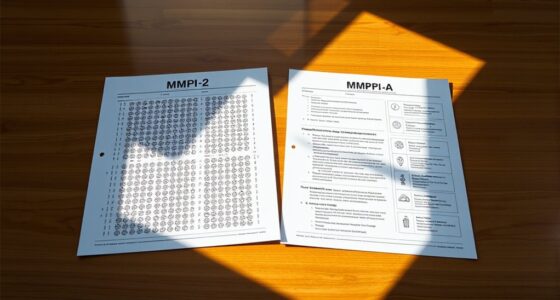Validity scales in the MMPI help guarantee your responses are honest and consistent. They check if you’re answering truthfully and reflect your true feelings or thoughts. These scales catch any attempts to manipulate results or provide misleading answers, protecting the test’s accuracy. When these scales indicate honest, stable responses, your results are more reliable. Keep exploring how these scales work, and you’ll better understand how your answers shape your psychological profile.
Key Takeaways
- Validity scales assess the honesty and sincerity of responses to ensure accurate MMPI results.
- They detect inconsistent, exaggerated, or socially desirable responding patterns.
- These scales help identify response biases that could distort psychological interpretations.
- Validity scales serve as checkpoints to confirm whether test results genuinely reflect the individual’s traits.
- They guide clinicians in determining if further assessment is necessary for reliable diagnosis.

Validity scales in the MMPI are essential tools that help assess the accuracy and truthfulness of a person’s responses during the test. When you take the MMPI, the primary goal is to understand your psychological functioning accurately. However, sometimes individuals might respond in ways that aren’t entirely genuine, either to present themselves in a better light or to conceal certain issues. This is where validity scales come into play—they serve as checkpoints to determine if your responses are valid and reliable. They analyze patterns within your answers to identify inconsistencies and detect efforts to distort your responses, ensuring the results reflect your true mental state.
Validity scales ensure honest, reliable responses, helping clinicians accurately interpret your true psychological state.
One of the key aspects these scales examine is response validity. Response validity refers to how truthful and sincere your answers are. If you’re giving honest responses, the validity scales will typically flag few or no issues, confirming that your results are trustworthy. Conversely, if you’re attempting to manipulate the test or hide certain traits, the scales will detect anomalies. For example, if you’re trying to appear healthier or more capable than you really are, the validity scales will pick up on this effort, signaling that your responses might not accurately represent your true condition. This helps clinicians interpret the results with caution and consider whether your answers might be biased.
Response consistency, another vital element, relates to the coherence of your answers throughout the test. The validity scales analyze whether your responses are consistent across different sections of the MMPI. If you answer similarly framed questions differently or show contradictions between related items, the scales will flag these discrepancies. Response inconsistency can be unintentional, such as misunderstandings or fatigue, but it can also indicate intentional response distortion. Recognizing these inconsistencies allows psychologists to judge whether your results are stable and trustworthy or if they need to be interpreted with skepticism. Additionally, the reliability of your responses impacts the overall usefulness of the assessment.
In practice, these validity scales act as safeguards. They help psychologists decide whether the test results are a reliable reflection of your true feelings, thoughts, and behaviors or if they’re compromised by response biases. If the scales suggest response validity issues or response inconsistency, the clinician might explore further or consider alternative assessment methods. This process ensures that the interpretations made from the MMPI are as accurate as possible, ultimately leading to better diagnosis and treatment planning. So, understanding how these scales work can give you confidence that your responses are being taken seriously and evaluated carefully, emphasizing the importance of honesty and clarity during the testing process.
Frequently Asked Questions
How Do Validity Scales Impact Overall MMPI Interpretation?
You can’t accurately interpret the MMPI without considering validity scales, as they assess response validity. These scales help you identify inconsistent or exaggerated answers, ensuring that your scale interpretation is based on genuine responses. By analyzing response validity, you avoid misdiagnosis and improve the overall accuracy of your assessment. Always review validity scales first to confirm the reliability of the data before making any clinical judgments.
Are Validity Scales Affected by Cultural Differences?
Yes, validity scales can be affected by cultural influence, as response bias may vary across different backgrounds. You might notice that cultural norms shape how individuals respond, potentially leading to inconsistent validity scale results. This means that when interpreting the MMPI, you should consider cultural context to avoid misjudging test validity. Recognizing these influences helps guarantee a more accurate understanding of a person’s true psychological profile.
Can Validity Scales Detect Malingering?
Yes, validity scales can detect malingering by identifying deceptive responses and response inconsistency. When you try to fake symptoms or exaggerate issues, these scales pick up on patterns that don’t align with genuine answers. They analyze inconsistencies and unusual response patterns, alerting clinicians to potential malingering. So, if you’re attempting to deceive, the validity scales help uncover those efforts through careful assessment of your response patterns.
How Reliable Are Validity Scales Across Different Populations?
Think of validity scales as a lighthouse guiding your assessment through foggy waters. They’re generally reliable, but cross-cultural variations and demographic influences can create shadows, making interpretations tricky. You must consider these differences to guarantee accurate readings. While validity scales are robust tools, their reliability varies across populations, so stay vigilant, adapt your approach, and remember that context shapes how these scales perform in diverse groups.
What Training Is Required to Interpret Validity Scales Accurately?
You need specialized training to interpret validity scales accurately, focusing on understanding their purpose and limitations. This includes coursework or supervised experience in psychological assessment, emphasizing interpretative skills related to detecting test-taking issues like exaggeration or defensiveness. By developing these skills, you’re better equipped to identify validity concerns, ensuring your interpretations are valid and meaningful in clinical or research settings.
Conclusion
Understanding the validity scales in the MMPI is like having a lighthouse guiding you through a foggy sea of responses. They help you navigate truth from pretense, ensuring your assessment stays on course. By paying attention to these scales, you steer clear of misinterpretations and find clarity in your results. Remember, they’re your compass in the complex landscape of psychological testing, illuminating the genuine from the feigned with unwavering light.









